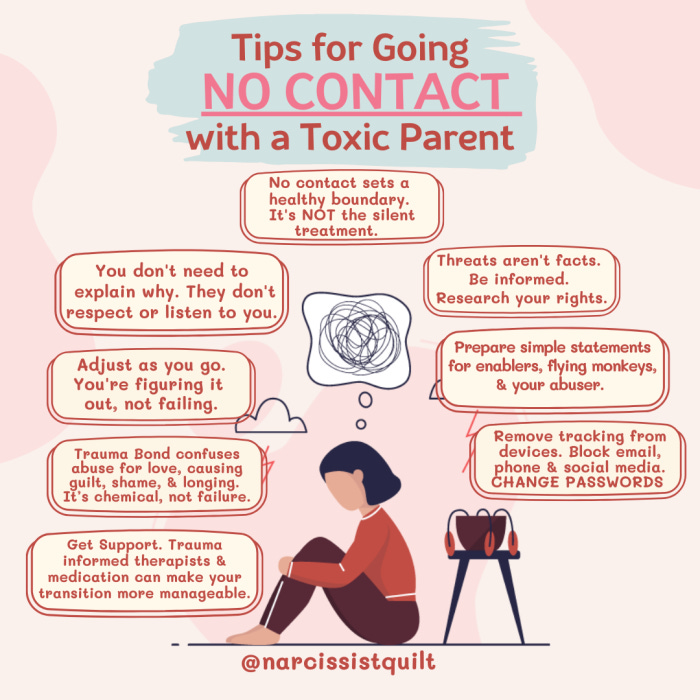When family ISN'T everything: how to go no-contact with a parent
What to expect when cutting off contact with a family member, plus how to set boundaries and care for yourself

While there’s still a fair amount of stigma around the idea of having no contact with family members, specifically parents, more adult children are making the choice to do so.
Karl Pillemer’s 2020 book, Fault Lines: Fractured Families and How to Mend Them, included research that 27% of Americans 18 and older — that’s around 67 million people — had cut off contact with a family member. Navigating complex family relationships can be challenging, especially for women over 40 who have reached a point in their lives where they prioritize their own well-being.
After years of regular therapy, self-care, and reflection, I began to recognize abusive and toxic patterns and behaviors in some of my immediate family members. After enforcing boundaries and speaking multiple times about the issues I had, I made the difficult decision to cut communication with both of my parents. While letting go of the dream of having a good and healthy relationship with my parents was hard, cutting ties has also been liberating and necessary for my overall health and well-being. Here’s some information to consider if you, too, are thinking about going no contact with your parents.
Navigating complex family relationships can be challenging, especially for women over 40 who have reached a point in their lives where they prioritize their own well-being.
What does going no-contact mean?
The no-contact rule just means having no communication or interaction with the toxic caregiver, similar to how one might get over an ex. Going no contact with your parents is a significant decision that completely cuts off communication and contact with them.
There are many reasons one might choose not to have a relationship with their mom or dad:
Abuse: If you have experienced physical, emotional, or psychological abuse from your parents, going no contact may be a necessary step to ensure your safety and mental health.
Unhealthy boundaries: Sometimes parents may not respect your boundaries, leading to constant intrusions into your life and decision-making. This can be detrimental to your self-esteem and autonomy.
Toxic relationships: Ongoing toxic relationships with parents can lead to emotional exhaustion, anxiety, and depression. Going no contact can provide relief from this ongoing emotional strain.
Emotional manipulation: Parents who use guilt, manipulation, or emotional blackmail to control their actions can make it challenging to lead a healthy, independent life.
In an article for the CPTSD Foundation, Shirley Davis suggests that going over the pros and cons of cutting ties with family is essential, as the decision will ultimately have big life-long consequences.
What to expect when going no contact
Going no contact with family members can be emotionally taxing, and you should be prepared for several challenges, including:
Fallout: Expect emotional turmoil and a period of grief as you mourn the loss of the relationship. This is a natural part of the process.
Resistance: Your parents may not accept your decision and might attempt to re-establish contact through various means. It's crucial to remain steadfast in your choice.
Cultural Stigma: Some cultures place a significant emphasis on family ties, and going no contact can be met with cultural resistance. Remember that mental health is paramount, and cultural stigma should not override your well-being.
In an article for the CPTSD Foundation, Shirley Davis suggests that going over the pros and cons of cutting ties with family is essential, as the decision will ultimately have big life-long consequences.
Pros of going no-contact
Feelings of peacefulness and freedom
The space to finally heal properly
More self-respect
An increase in self-confidence
Newfound feelings of self-control and self-reliance
Cons of going no-contact
Grief or guilt
Remorse
Backlash from family and other loved ones
Feeling of loneliness
Depression and anxiety
Are there alternatives to going no-contact?
Going no contact is a big step, but it doesn’t have to be all-or-nothing, or even a permanent decision. Before making my decision to have no contact with my mother, I had played around with the idea in my head for nearly a year. Initially, I asked for 30 days of no-contact with her before muting and blocking her on socials and such. When she reached out angrily within days, I was annoyed, but not surprised, and 30 days quickly became indefinitely.
Some people might find simply limiting contact and setting clear boundaries for interactions is enough. Family therapy is a good way for families to work on their issues and uncover unhealthy dynamics before resorting to cutting communication.
Tips for establishing stronger boundaries and not breaking no-contact
Since going no contact is generally a last resort, it makes sense that one might have second thoughts or even want to break the no contact rule to see if relationship conditions have changed. VeryWell Mind suggests resisting the urge to do so, by refocusing on yourself and engaging in self care tactics. Keeping a journal and writing down your feelings is a great way to process your emotions. Other suggestions include leaning into friends, or even taking on new hobbies.
Family therapy is a good way for families to work on their issues and uncover unhealthy dynamics before resorting to cutting communication.
A few tips for establishing stronger boundaries
Self-care: Focus on self-care practices that promote your well-being, such as therapy, meditation, exercise, and maintaining a support system of friends and loved ones.
Stick to your decision: Be resolute in your choice to go no contact, even in the face of resistance or guilt.
Build a support network: Surround yourself with a support network of friends, support groups, or therapists who can provide guidance and emotional support during this challenging time.
When it comes to deciding to stop communication with a family member, remember your well-being comes first and you have the right to create a life that prioritizes that. For me, having no contact with my parents has been a huge step towards achieving that goal.
You might also enjoy this on The Midst:
Is it a midlife crisis or midlife recovery?
When your dad's a jerk, is it okay to accept his love?
Curious about conscious uncoupling? “Nesting” co-parenting is on the rise for good reason
Niesha is the social media manager for The Midst. Additionally, she is a writer and sensitivity reader. Bylines include Insider, BUST, Women's Health, Glamour, and many other publications.
We may receive commissions from some of the product links. All products and services are reviewed independently by our writers.







